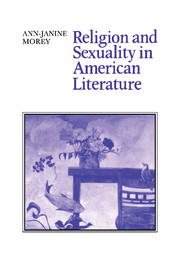Book contents
- Frontmatter
- Contents
- Acknowledgments
- Introduction
- 1 Body Language: Religion, Sexuality, and the Bioluminescence of Metaphor
- 2 The Stubborn Density of Desire: Religion and Sexuality in Nineteenth-Century Fiction
- 3 A Tradition of Divine Lechery: Men Write about the Ministry
- 4 A War of Words: Women Write about the Ministry. The Homiletic writers
- 5 Comfort to the Enemy: Women Write about the Ministry. The Parsonage Romance
- 6 The Fox in the Well: Metaphors of Embodiment in the Androcentric Imagination
- 7 Fatal Abstractions: Metaphors of Embodiment in the Gynocentric Imagination
- 8 Conclusion: Words Are Not the Thing Itself
- Appendix A The Homiletic Novels and Their Authors
- Appendix B The Parsonage Romances and Their Authors
- Bibliography
- Index
- Cambridge Studies in American Literature and Culture
3 - A Tradition of Divine Lechery: Men Write about the Ministry
Published online by Cambridge University Press: 25 March 2010
- Frontmatter
- Contents
- Acknowledgments
- Introduction
- 1 Body Language: Religion, Sexuality, and the Bioluminescence of Metaphor
- 2 The Stubborn Density of Desire: Religion and Sexuality in Nineteenth-Century Fiction
- 3 A Tradition of Divine Lechery: Men Write about the Ministry
- 4 A War of Words: Women Write about the Ministry. The Homiletic writers
- 5 Comfort to the Enemy: Women Write about the Ministry. The Parsonage Romance
- 6 The Fox in the Well: Metaphors of Embodiment in the Androcentric Imagination
- 7 Fatal Abstractions: Metaphors of Embodiment in the Gynocentric Imagination
- 8 Conclusion: Words Are Not the Thing Itself
- Appendix A The Homiletic Novels and Their Authors
- Appendix B The Parsonage Romances and Their Authors
- Bibliography
- Index
- Cambridge Studies in American Literature and Culture
Summary
In 1885 Annie Burnham Cooper was twenty years old, and she recorded in her diary the events of an unexpectedly amorous spring. Her fortyfour-year-old minister, a Mr. Camp, seemed to be flirting with her. The diary entries published in Private Pages: Diaries of American Women, 1830's- 1970's introduce us to a sensitive, energetic, and healthy young woman who is alternately intrigued and repulsed by the attentions of her spiritual guide. She does not seem unduly alarmed at the attentions of men or even an older man, although like many a passionate and perceptive young woman, she fields the events of courtship with a sense of high drama. What separates this courtship from others is his profession. As she says, he “comes here and take tea & flatter me just lays it on thick, and then flirt, & do all sorts of things that would be charming in any other man, but for a minister,——! Well, I don't know!” Between entries about her new romance, she meditates with great severity upon her own Christian shortcomings.
In late May she professes herself overwhelmed by the attentions of her forty-four-year-old minister. She continues: “I dare not put on paper the soft sweet words he tells me, if I were his ‘sweetheart’ he could not say or act much more, but he knows I understand and match him in that.” The occasion for this sentiment has been a woodland ride and wishes made over a secluded spring.
- Type
- Chapter
- Information
- Religion and Sexuality in American Literature , pp. 75 - 103Publisher: Cambridge University PressPrint publication year: 1992

